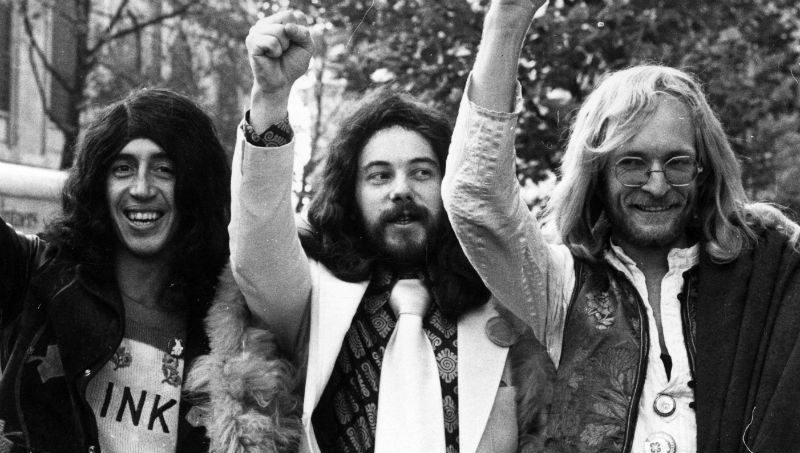Felix Dennis remembered: publisher, poet and tree-planter
The legacy of the 'outrageous' publisher, who died a year ago, includes the Heart of England Forest

A free daily email with the biggest news stories of the day – and the best features from TheWeek.com
You are now subscribed
Your newsletter sign-up was successful
Felix Dennis, the "larger-than-life" magazine publisher, died one year ago today at the age of 67. He had built a transatlantic magazine empire worth £500m, which included The Week, but he will also be remembered for his poetry and for founding a charity dedicated to planting trees. His tenth and final book of verse, I Just Stepped Out, was published earlier this month and includes poems written by Dennis between the date of his cancer diagnosis and his death.
After his death last year, journalists, readers and business rivals remembered the "60s radical" who was as "outrageous" as he was "passionate":
Focused on success
The Week
Escape your echo chamber. Get the facts behind the news, plus analysis from multiple perspectives.

Sign up for The Week's Free Newsletters
From our morning news briefing to a weekly Good News Newsletter, get the best of The Week delivered directly to your inbox.
From our morning news briefing to a weekly Good News Newsletter, get the best of The Week delivered directly to your inbox.
One of Dennis's formative experiences in publishing came when he was co-editor of the alternative magazine Oz, which gave a voice to 1960s counter-culture and then helped to banish some of the fustiness that had previously characterised the publishing industry.
"He joked that he would be remembered above all as one of the three young editors in the Oz obscenity trial of 1971," The Guardian's obituary relays. The case revolved around, of all things, a sexually explicit comic strip of Rupert the Bear. When Dennis (pictured above, between co-defendants Richard Neville and James Anderson) had his conviction overturned, it seemed to mark the end of an era in which the establishment believed it had a veto over the tastes of the young and hip.
Despite, or perhaps because of, his run-in with the law, Dennis credited Oz "with teaching him how to be an entrepreneur", The Guardian says. "It was a talent that he developed with spectacular success, establishing one of the world's leading independent media companies, with a current turnover of £100m a year."
Fame and infamy
A free daily email with the biggest news stories of the day – and the best features from TheWeek.com
Unlike many in the increasingly bland business world, Dennis made little attempt to suppress his personality. He was "infamous" for having been the first person to use the C-word on British television, The Independent reports. On 7 November 1970, "when being interviewed on The Frost Programme, he described activist Jerry Rubin as the 'most unreasonable c*** I've ever met'. He later regretted his use of the word, saying he had behaved 'bloody abominably'."
A passion for what he did
No-one who worked with Dennis had any doubt about his commitment to the trade. "He loved magazines," writes David Hepworth in The Guardian. "He would hold them up to his face and rub them against his cheek – but he feared for them. In the year 2000, he gave a speech in which he promised that four horsemen were about to descend on the magazine business. These were: new technology, environmental pressure, illiteracy and costs. Who's to say he was wrong?"
He adored not only the editorial side of the business, but the commercial side too. "When Maxim was at its height in the United States," Hepworth says, "I sat with him while he went through a new issue, purring over every page of advertising, pulling out a gatefold and cackling 'you know how much they paid for that?'"
Rock 'n' roll lifestyle
The income from his increasingly successful company "funded a lifestyle of unrestrained hedonism", according to the Daily Telegraph obituary. "After making his first million, Dennis discovered crack cocaine which, at the height of his addiction, his chauffeur would 'bring home in buckets'."
Dennis once confessed, or perhaps boasted, that he had spent as much as £100 million on sex, drugs and rock 'n' roll. "It was complete madness," he told the BBC in 2006. "I'm very embarrassed about it. I had a wonderful time, I'm not going to lie, but I shouldn't have done it."
A popular poet
When he tired of the drugs and the "garage of Rolls-Royces and Bentleys", Dennis turned to a more cerebral addiction. "He kicked the habit, went cold turkey and took up writing poetry instead," the Telegraph says. His first volume of verse, A Glass Half Full, published in 2002, "shifted 10,000 copies – a colossal figure by the standards of poetry sales" and "the South Bank Show devoted an hour-long documentary" to his work.
A forest in the heart of England
"Felix's love of poetry was matched by his passion for trees," The Guardian says. Twenty-five years ago he began planting woodland and, as with everything he did, there were to be no half-measures. "Over the years he acquired more land around the Old Manor, Warwickshire, which he had purchased in 1987, and planted 300 acres annually until the total woodland area, now the Heart of England forest, reached 2,500 acres."
In his poetry, he hinted at the comfort he found in setting down new woodland: "Whosoever plants a tree / Winks at immortality," he wrote in 2010.